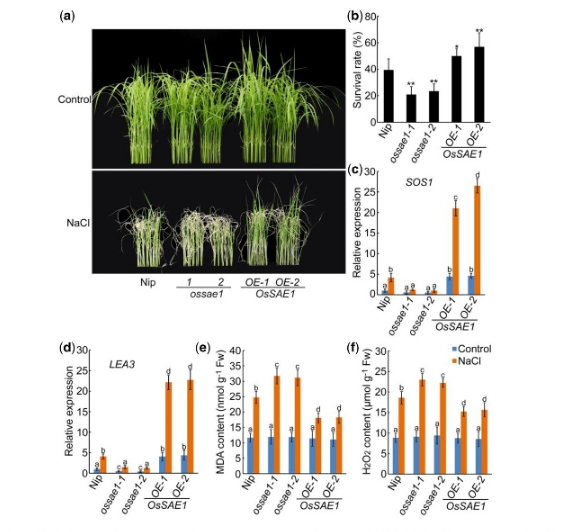Abstract:
Rice (Oryza sativa) germination and seedling establishment, particularly in increasingly saline soils, are critical to ensure successful crop yields. Seed vigor, which determines germination and seedling growth, is a complex trait affected by exogenous (environmental) and endogenous (hormonal) factors. Here, we used genetic and biochemical analyses to uncover the role of an APETALA2-type transcription factor, SALT AND ABA RESPONSE ERF1 (OsSAE1), as a positive regulator of seed germination and salt tolerance in rice by repressing the expression of ABSCISIC ACID-INSENSITIVE5 (OsABI5). ossae1 knockout lines exhibited delayed seed germination, enhanced sensitivity to abscisic acid (ABA) during germination and in early seedling growth, and reduced seedling salt tolerance. OsSAE1 overexpression lines exhibited the converse phenotype, with increased seed germination and salt tolerance. In vivo and in vitro assays indicated that OsSAE1 binds directly to the promoter of OsABI5, a major downstream component of the ABA signaling pathway and acts as a major regulator of seed germination and stress response. Genetic analyses revealed that OsABI5-mediated ABA signaling functions downstream of OsSAE1. This study provides important insights into OsSAE1 regulation of seed vigor and salt tolerance and facilitates the practical use of OsSAE1 in breeding salt-tolerant varieties suitable for direct seeding cultivation.
An APETALA2 transcription factor positively regulates seed germination, seedling growth, and salt tolerance in rice by repressing the expression of an abscisic acid signaling component.
Keywords:BZIP TRANSCRIPTION FACTOR;DROUGHT TOLERANCE;POSITIVE REGULATOR;ROOT DEVELOPMENT;FACTOR FAMILY;EXPRESSION;SALINITY;GENE;ESTABLISHMENT;BIOSYNTHESIS



